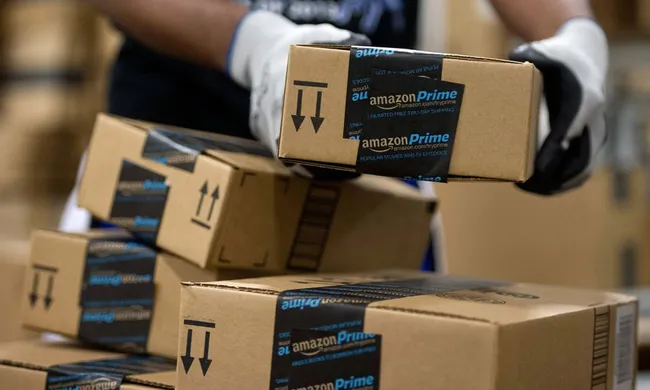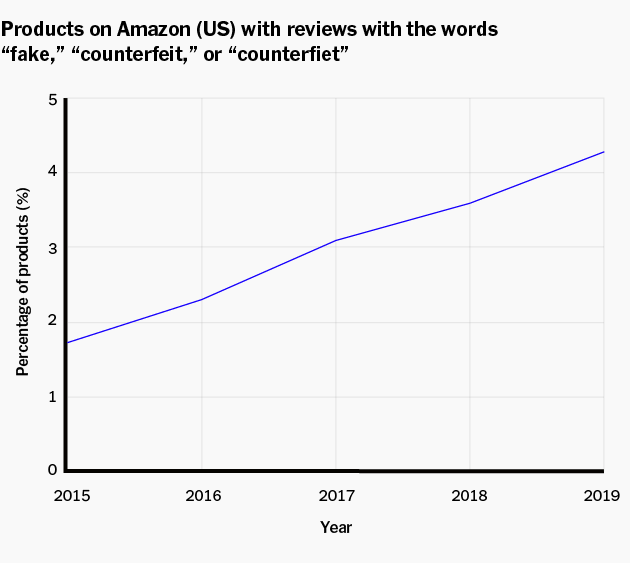Amazon Leverages Machine Learning to Fight Counterfeits and Fraud
- We are now in the era of counterfeit products
- Fake products are on the rise
- Amazon is fighting back
While we mainly explore fraud and counterfeit scams from the payment side of things, it should be noted that the popularity of online shopping -- particularly during the COVID-19 pandemic -- has created a new breed of fraudster that creates and sells fake products.

Meanwhile, the king of online commerce, Amazon, is not immune from fraudsters, as reported in WIRED Magazine:
Over the course of two years, four brothers in New York allegedly swindled Amazon out of at least $19 million using thousands of $94 toothbrushes and other expensive goods, according to a Department of Justice indictment unsealed Wednesday. Federal prosecutors accused Yoel Abraham, Heshl Abraham, Zishe Abraham, and Shmuel Abraham of invoicing Amazon for a large number of products the company never ordered. The defendants allegedly discussed their gimmick openly in a family WhatsApp group. In one message from May 2018, the indictment says, Yoel wrote that he was “so in the mood to f••• Amazon.”
This is a scam called “overshipping,” where you intentionally send a company more goods than it ordered and bill for it. In this case, the scheme involved 7,000 $94 toothbrushes.
According to the indictment, the brothers swapped ASINs [every Amazon product is given a string of numbers called an Amazon Standard Identification Number] for items Amazon ordered to send large quantities of different goods instead. In one instance, Amazon ordered 12 canisters of disinfectant spray costing $94.03. The defendants allegedly shipped 7,000 toothbrushes costing $94.03 each, using the code for the disinfectant spray, and later billed Amazon for over $650,000.

Source: Tomsguide.com
In another instance, Amazon ordered a single bottle of designer perfume for $289.78. In response, according to the indictment, the defendants sent 927 plastic beard trimmers costing $289.79 each, using the ASIN for the perfume. Prosecutors say the brothers frequently shipped and charged Amazon for more than 10,000 units of an item when it had requested fewer than 100. Once Amazon detected the fraud and shut down their accounts, the brothers allegedly tried to open new ones using fake names, different email addresses, and VPNs to obscure their identity. “Open account under dummy names and they can go look for no one,” Yoel allegedly wrote on WhatsApp in the fall of 2018.
Much like using routing and bank account numbers can allow check fraudsters to fool individual sea financial institutions long enough to make off with stolen cash, the brothers used Amazon's internal ASIN system to fool the system long long enough to get a payout. They were, of course, eventually caught.
Be on the Lookout for Fakes
Meanwhile, counterfeit products remain problematic enough that The New York Times Wirecutter offers both advice on how to spot counterfeits as well as what to do if you find you've purchased a fake.

Of the reviews submitted to and analyzed by ReviewMeta from January 2015 through October 2019, mentions of the word “fake,” “counterfeit,” or “counterfiet” rose from 1.725 percent to 4.275 percent. Although the context of the usage was not analyzed, it shows a rise in the discussion about the words. (New York Times)
A Mountain of Products to Evaluate
Amazon deals in such an enormous variety of products that move from sale to shipping so quickly that it is nearly impossible to keep track of what's moving through the warehouses. Add to that the fact that 53% of products offered are from third-party sellers, and you have an overwhelming amount of merch to search.

Source: Amazon.com
Amazon has to take this problem seriously, of course, to remain credible, so they created an anti-counterfeit initiative called Project Zero. They recently announced that the program is expanded to seven new countries - Australia, Brazil, Netherlands, Saudi Arabia, Singapore, Turkey, and the UAE - making it available in 17 countries where Amazon has a store.
Amazon utilizes machine learning tech to "proactively and continuously scan more than 5 billion attempted daily product listing updates globally to look for suspicious listings." This way, they can keep offerings fresh while ensuring that the products offered are real.
From the Amazon press release:
Amazon’s automated protections proactively and continuously scan more than 5 billion attempted daily product listing updates globally to look for suspicious listings. These automated protections are powered by Amazon’s machine learning and are continuously fed new information, so we continue to get better in automatically preventing and blocking potential counterfeit listings.

Source: Whizlab.com
Amazon’s automated protections proactively and continuously scan more than 5 billion attempted daily product listing updates globally to look for suspicious listings. These automated protections are powered by Amazon’s machine learning and are continuously fed new information, so we continue to get better in automatically preventing and blocking potential counterfeit listings.
We have invested significant resources over the years to proactively prevent counterfeits and continue to innovate and build technology-based solutions. Project Zero goes further with a self-service tool to empower brands and provides them with an unprecedented ability to directly remove listings from our store. These removals also feed into our automated protections, so we can better catch potential counterfeit listings proactively in the future.
Product serialization is enabled by a unique code that brands apply within their manufacturing or packaging process, and it allows us to individually scan and confirm the authenticity of every single purchase of a brand’s enrolled products from Amazon’s stores. While product serialization is optional, brands enrolled in Project Zero are seeing the best results when using product serialization.
From those dealing with invoice fraud to the largest companies in the world, no company is immune to fraud and/or counterfeits. When we take into account the massive number of items a company is purchasing or selling, no human is able to check each individual item or order, and that is where Artificial Intelligence and Machine Learning can be the most effective tool in stopping fraud, as it is capable of reviewing and analyzing millions of items in short periods of times.
Whether it's stopping fraudulent check payments or spotting fraudulent goods before they go on sale, we will continue to see the emergence of AI and Machine Learning technologies to frustrate fraudsters.